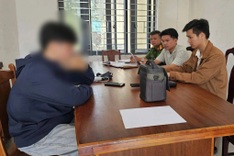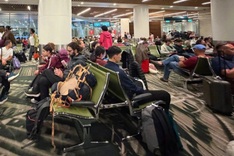Love, life, and the pursuit of happiness in America. It can get complicated, especially when the romance takes place across oceans, and when governments get in the way.
 |
| Kurtis Wichmann (right) and his wife and stepdaughter. Courtesy of Kurtis Wichmann |
Kurtis Wichmann has been desperately trying to bring his wife and daughter to America and start a life together. But they're at the mercy of a system that's said to be so mired in bureaucracy and, at times, racism, that it's keeping the doors of family and freedom securely fastened.
"I'd hate to say it, but I would have to leave my country because if it comes to a country that denies my wife to come and live with me, I can't do that."
Until now, Kurtis Wichmann could never imagine walking away from his country. His country had never turned its back on him before.
He says that changed five years ago, across the Pacific Ocean, eight thousand miles away in Nha Trang, Vietnam.
It's when Kurtis first focused his camera on a beautiful woman selling vegetables in a street market. Despite the language barrier Kurtis says there was a spark between them.
"Somehow, we ended up with her inviting me to come for dinner later on that day and I got to eat with the whole family," he says.
Every date was like that. And over the next two years, Kurtis would make four trips from his home in Rancho Cordova to see Trang and her daughter Oahn. The three of them grew closer with each visit. And when he couldn't be there in person, the Internet would bring them together.
"Oh, it's my highlight of my day."
Finally, in December of 2006, Kurtis took the next big step.
"And I said would you like to marry me? And all she did was giggle. She didn't get really what it meant."
Kurtis was ready to bring the girls back to the United States where they could begin their lives together, as a family.
But 284 miles away in Ho Chi Minh City, an officer at the U.S. consulate would have to decide whether to approve the girls' immigrant visas. Without them, they couldn't leave Vietnam.
Then the officer said something that stunned the newlyweds.
"He just straight out told her he thought this was a sham wedding and marriage, that it wasn't real, that we didn't know each other."
A denial letter issued by the U.S. consulate general confirms that very decision.
Kurtis says the officer never looked at the more than 1000 pieces of evidence they gave him, including 600 pages of emails and instant messages, their wedding license, 120 photos spanning nearly three years, and receipts from shops, hotels, restaurants, and airlines. And he certainly didn't believe they talked over the Internet.
"The consulate office said that's it, it's done."
The consulate sent its recommendation to the immigration department, and they automatically agreed: there was no bona fide wedding. Visas denied.
It looked like Kurtis had little hope of bringing his family home.
"No. This is my family, this is my life, this is everything that I have in my life I hold dear; it's them."
Kurtis had only begun to fight. He hired immigration attorney Christine Troy, in San Francisco.
"There are problems every single day with the way that the U.S. consulates treat legitimate relationships."
Ms. Troy says consulates are fiefdoms that have very little oversight and subject their citizens to the whims of consular officers.
"And they're basically hostile to these cases so they're not letting the people in there actually to try to prove their case. They're not asking the right kind of questions, they're not considering the evidence that people are bringing in," Ms. Troy says.
She says the consular officer who met with Trang in Ho Chi Minh City was a Vietnamese national, and that could have worked against her.
"Women who are Vietnamese who date or marry white men are looked down upon… you're really seen as less than everyone else."
In fact, there have been enough complaints against the Ho Chi Minh City consulate, that Congressman Neil Abercrombie, of Hawaii, conducted an inquiry.
The Department of State responded "...DOS statistics does not appear to support the complain[ts] and ... show that the number of visas approved in Ho Chi Minh City far outweigh the number of visas that are refused."
The State Department could not provide numbers to back that up. Now, more three years into trying to bring his family home, Kurtis' health suffers. All three talk daily, desperately trying to keep each others spirits up.
But for every day that passes, it's that much harder to not think of the reality he may face.
"If your government said you couldn't be with your family, what are you gonna do? You have to give up your family or give up your country. Well, there's nothing more important than my family. I'll go pick rice. I won't make any money, but at it at least I'll have my girls with me."
This saga has been ongoing since 2006.
Late developments -- Kurtis' wife Trang has a new hearing with a consular officer on March 10th.
She's going to, again, recount her relationship with Kurtis, and hopefully get them to review all of the evidence proving their marriage is not a sham.
If it's denied this time, Kurtis will have a tough decision to make ahead of him.




















